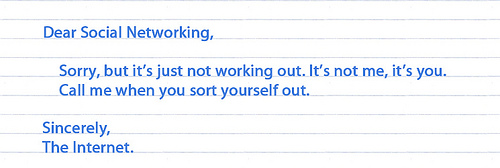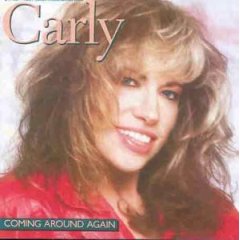Introvert is the new black
by Adam Cochran
Over the past year I have noticed that introverts are all the rage. Introverts are the new extroverts. Everyone wants to be one. All of the geek blogs are posting about how to be a successful introvert, how to be an introvert and still have friends, or top ten lists of the most powerful introverts.
I joined Facebook on August 13, 2008 almost a year after I joined Twitter. It was an experiment. I am not an introvert, I prefer to talk to people in person. I like to mingle. That said, I love social media because it keeps me educated on what all the hip cats are calling the bees knees.
Social networks, prior to Facebook, never really appealed to me because I was married, had four kids and my business was doing well. Before Facebook (arguably before Twitter), social networks were designed to be more like dimly-lit singles bars where everyone had a great body but a bag over their head.
Facebook was the first major full-featured social network to remove anonymity, which made it the first social network that was actually useful for being a legitimate social tool.
Being happily married, I had no use for the anonymous singles bar atmosphere of MySpace-era social networks. But, I had lost touch with almost all of my best friends from high school and middle school. The need to meet other Neil Diamond fans didn’t really appeal to me, but I was very interested in what my former co-workers were up to.
Like everyone else, my first few weeks on Facebook were spent finding people I had lost touch with, friending them and then looking through their pictures. And, I like everyone else, I felt like I was doing something sneaky but insightful. Everyone from my past turned out to be disappointingly normal. Sure, there were a handful that hit it pretty big and a few that I expected to hit it big that fell short of what I had envisioned for their future when I was in 11th grade. Most, though, were married or divorced with boring jobs and average incomes and real estate.
Over the years my Twitter feed has become a way for me to get a pulse of what’s going on in the world and my Facebook feed has taken the place of Twitter for my daily news consumption. Roughly 30 percent of my Facebook feed are humans, the rest are companies, news outlets, publications and trend aggregators – some might call them blogs.
Two years ago I reduced my number of Facebook friends from almost 2000 to less than 500. I only have two rules for Facebook friends: 1. I have to have had a conversation with the person in real life, 2. They have to occasionally post something worth reading. I will count interesting comments in my qualifications for No. 2.
Occasionally, I contemplate whether I should unfriend the guy who was the lunchroom “You gonna eat that” kid who I haven’t talked to in real life since third grade or the assortment of people from all ages and backgrounds that only post about whether they ran or did not run on a given day.
There are some things that will get you unfriended immediately. If you post more than three recipes in a week, you’re gone. Pinterest works because it allows me to search for what I want to see. Few things in social media are more annoying than when someone uses Facebook to share something they found on Pinterest – especially if it’s an untested recipe. Everyone who cares deeply about recipes or cute outfits has a Pinterest account.
Over the past two years, I have noticed that the Facebook algorithm has caught-on to how I use Facebook. It is common for people to complain that Facebook doesn’t let them see every post from every person every time they post, but I consider this a good thing. While I do have a lot of human friends on Facebook, I find the real value of Facebook, for me personally, is in the ability to follow news outlets and brands. This probably makes Facebook very happy because that is what they want me to do.
While I love to hear about my siblings adventures through day-to-day life, I find that posts from Fast Company, Wired, and the local news stations of play a more significant role in my day-to-day life as a professional.
There is a big disadvantage to seeing so many professional pages on a Facebook feed. When something is in the process of going viral, that content item is all I see. Over and over and over and over. Some accounts do a standard share of the content, others totally re-write the headline or the body copy and make it their own (as much their own as stolen content can be).
Sites such as BuzzFeed and UpWorthy are like the supermarket tabloids of the Internet, but they do serve a purpose. They tell us everyone will be talking about for the next week, before everyone is talking about it. In the tabloid world, that’s a rather insignificant truth. However, In the world of mass communication via the Internet’s popular culture, it’s a very big deal.
Popular culture in the world of geeks is a different realm that popular culture in the world of couch potatoes.
While the fashion and entertainment industries rely heavily on television to inform the world what everyone is wearing to the latest gala or awards ceremony, the Joan Riverses of geek popular culture are writing 1200-word scathing satirical pieces on what Facebook will do with Oculus Rift, Apples acquisition of Beats, and don’t even get me started on Net Neutrality.
Traditional and geek popular culture fanatics have more in common than what may appear on the surface. They both have their superstars, they both have their lingo, they both require a little command of historical reference related to their given industry.
If there is a difference it’s that geek popular culture requires a constant awareness of trends without a single focal point. Traditional popular culture may have an intense awareness of itself, but it typically fails to recognize that anything outside of its own world exists. On the other hand, geek popular culture requires a Ken-Jennings-meets-Dennis-Miller-like ability to twist cultural, scientific, entertainment and academic references so that the digitally-educated introvert can use Google and Wikipedia to research as they read, watch, or listen.
Please allow me to introduce a couple of examples that compare and contrast geek popular culture with traditional popular culture…
In this video we see what appears to be a traditional popular culture reference. But look a little closer. The chances are you either know who Tupac is, or you know who Freddie Mercury is – unless you are a geek. Dive in deeper as you watch the video. If you pause the video several times so that you could google a split-second reference by the host in order to understand the concept, you have just succumbed to geek popular culture.
That’s one of the most significant differences between geek popular culture and traditional popular culture. Traditional popular culture attempts to cut down it’s message to find the largest possible denominator. Andy Worhol pioneered traditional popular culture by using Campbell’s soup and Marilyn Monroe. The most common modern comparison to Andy Worhol would be Banksy. While many of his works are simple and easy to interpret, just as many require an awareness of multiple reference points that breach the boundaries of any single industry, culture or market.
For comparison, here is a video to contrast with the PBS Idea Channel shown above…
Wow! I need to end this article now. All the blood just drained out of my brain and I need to go spend some time with John and Hank Green to get it back.
Related articles








